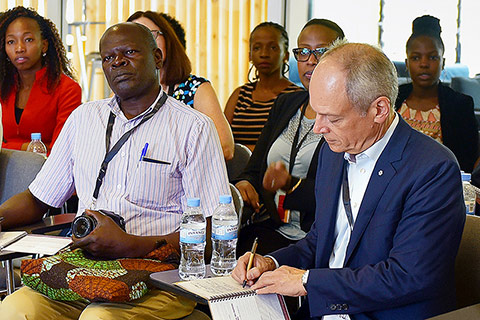When University of Toronto president Meric Gertler first began consulting with U of T community members about making global partnerships one of the university’s key priorities, colleagues advised him not to limit collaborations to the most obvious choices.
“We talked about how we should think about regions like Africa, where not only are U of T faculty and students helping countries move along a progressive path, but also where we can learn a lot from those experiences ourselves,” he says.
Recently, Gertler visited Ethiopia and Rwanda as part of the university’s ongoing efforts to raise U of T’s global profile and promote international partnerships. It was his first time travelling to Africa and likely the first official visit by a U of T president to the continent. In an interview after his return, Gertler says he saw signs that the educational systems are developing rapidly and that economic growth is robust.
“I came away with a heightened sense of excitement about the potential for the U of T to contribute to and learn from engagement with our African partners,” he says.
In Ethiopia, Gertler saw first-hand the results of a 14-year collaboration between U of T and Addis Ababa University that has helped transform health care and higher education in that country.
When the Toronto Addis Ababa Academic Collaboration began, Ethiopia, a country of 73 million people, had only 11 psychiatrists. Today, the number is 80. And those graduates have developed psychiatry departments at several other institutions across the country.
The collaboration has grown as well – from a single discipline to 21, including pharmacy, dentistry, anesthesiology, engineering and library sciences. Dr. Jane Philpott, now federal minister of Indigenous Services (and still a professor in U of T’s Faculty of Medicine), helped start the family medicine training program in Ethiopia in 2013.
On average, 80 U of T faculty, students and alumni travel to Addis Ababa every year to volunteer for academic training, research collaboration, teaching, clinical supervision and mentorship. “A lot of people talk about capacity development in Africa,” Gertler says. “One model is to bring African students to Canada, the U.S. or the U.K., educate them and hope they’ll return and do good things in their home countries or elsewhere in Africa. Another approach is to work in Africa. Over 95 per cent of the graduates from this collaboration have remained in Ethiopia and have gone on to do great things. That’s an astounding track record.”
Gertler says he was also impressed by the reciprocal nature of the Addis Ababa program. U of T faculty told him they found their work there rewarding and that they were learning from their Ethiopian counterparts about tackling challenges with limited resources.
In Rwanda, Gertler participated in the annual conference of the Mastercard Foundation Scholars Program, which provides financial support for qualified and disadvantaged students from sub-Saharan Africa to pursue higher education at institutions such as U of T.
Since 2013, students have come to the University of Toronto from Kenya, Ghana, Nigeria, Rwanda, Ethiopia and other African countries. The scholarship covers tuition in the Faculty of Arts and Science and the Faculty of Applied Science and Engineering. It also pays for books, living expenses and airfare.
Last June, U of T graduated its first cohort of Mastercard Foundation scholars. Gertler says having students on campus from across Africa has changed the university’s outlook on how to prioritize international partnerships. “Their presence has helped to elevate interest among faculty and students and staff in Africa.”






No Responses to “ Our Partners in Africa ”
This is so encouraging. I would like to see U of T to continue to do more to connect African and Canadian institutions. It is good for Africa and it is good for Canada.